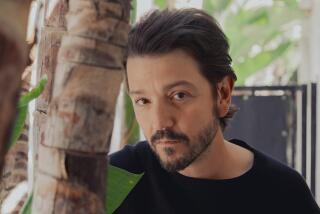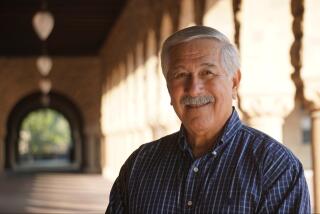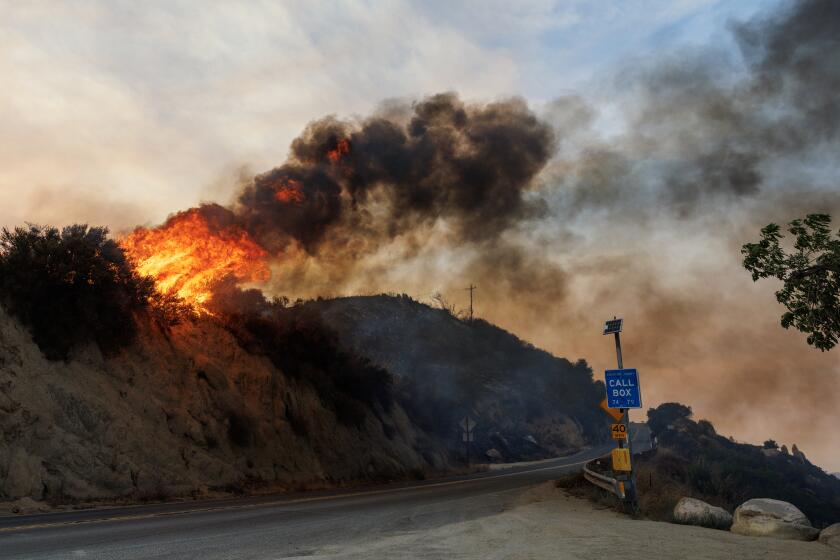In This Fight, Rudy Acuna Has All Angles Covered : GEORGE RAMOS
Rudy Acuna is an outspoken man. He loves the city of L.A. but hates the San Fernando Valley, where he lives and teaches, because, he says, it is a suffocating place that breeds racism. In front of sympathetic audiences, he elicits raucous applause when he uses his favorite lines.
“I’m proud of being a militant,” he says. “I’m proud of being a radical. I’m very proud of my age (59). I’m very proud of being a Mexican!”
He’s been described at various times as a troublemaker, an authority on Chicanos and their place in American society, a polemicist and pamphleteer, the conscience of Latino politics, and a pain in the butt. He’s leaped into many controversies, dishing out ample doses of Chicano rhetoric and unwelcome advice.
His latest battle, with administrators at UC Santa Barbara, is typically tough. But he’s brought a new approach--and a new job title--to the struggle. He’s become a filmmaker chronicling his own dispute. Enamored with the common-folks-getting-shafted theme of the 1989 documentary “Roger & Me,” Acuna has decided to follow suit.
His film is called “Barbara & We.”
Rodolfo F. Acuna’s beef with Barbara S. Uehling, the chancellor at UC Santa Barbara, grew out of a need for a new challenge. Founder of the Chicano studies department at Cal State Northridge, one of the largest in the U.S., he thought he had little more to prove in L.A. He has a wife and a 7-year-old daughter to think of and, perhaps, it was time for a slower pace after 24 years at CSUN.
He applied in 1991 for a full-time professorship in Chicano studies at UC Santa Barbara. It was a modest increase from his current annual salary of $65,000. Given his expertise, partly based on his 1972 book, “Occupied America: A History of Chicanos,” he seemed a logical choice.
Acuna was turned down for the position. In a lengthy explanation of the decision, Julius Zelmanowitz, associate vice chancellor for academic personnel, wrote that campus officials, who reviewed his qualifications, thought he didn’t have the right stuff.
Acuna’s scholarship in Chicano studies was called “ ‘marginal,’ ‘thin’ and more political and passionate than objective and substantive,” wrote Zelmanowitz. One reviewer, quoted by Zelmanowitz, said:
“A person of Professor Acuna’s stature and experience would stand so far above the rest of his colleagues that his position could verge on being dictatorial. Certainly he would be the most powerful single voice in all department affairs. . . . This would have a potentially dominating influence on the kind of research and writing that would be smiled upon, or rejected as wrong or unacceptable. More than ordinarily, then, the future character of the department of Chicano studies will be shaped for years into the future by his one hiring decision.”
Others would have accepted the university’s decision. But not Acuna. “Everybody told me not to take them on,” he admitted. “I think you have to confront injustice, even if you have a bad case.”
He sued, claiming discrimination. He accused the university of not attracting enough Latino students and faculty members. He accused UC Santa Barbara officials of wasting taxpayers’ money fighting him in court. He organized marches and rallies to bolster his charges, which campus officials deny.
He also recruited aspiring film students to help with “Barbara & We.”
The low-budget film’s motive is simple. Acuna wants it to focus on how inept he says the school is at helping Latinos in its own back yard. Rather than telling the “me” story of a rejected Chicano professor, the film would be about “we,” Latinos ignored by an uncaring bureaucracy.
And taking a page from filmmaker Michael Moore, whose comical attempts to talk to then-General Motors President Roger Smith were highlights of “Roger & Me,” Acuna has tried to talk to Uehling on camera. One such try was rebuffed recently in Pasadena. He’s likely to try again.
If the prospect of a camera-toting professor confronting Uehling or another UC administrator seems unlikely to win the job Acuna seeks, he says that may be beside the point.
“It’s really doesn’t matter if I’m hired at Santa Barbara,” he says. “The central issue is how this university services this community. I’m not really a filmmaker, but these Chicano kids who help me, maybe they can become filmmakers.”
Maybe, but I can’t escape the feeling that it’s the give-em-hell tactic that Acuna really relishes.
More to Read
Sign up for Essential California
The most important California stories and recommendations in your inbox every morning.
You may occasionally receive promotional content from the Los Angeles Times.










